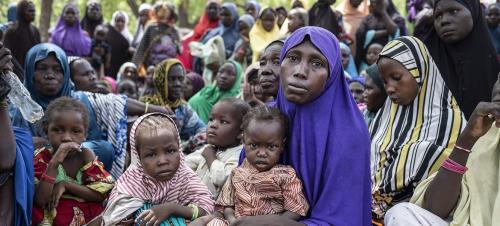Nigeria: UN genocide expert warns against worsening security situation
The UN Special Adviser on the Prevention of Genocide on Thursday voiced concern over the worsening security situation in Nigeria, while urging the authorities to ensure counter-terrorism operations are conducted in line with international human rights and humanitarian law.

Internally displaced mothers with their children attend a WFP famine assessment exercise in Borno State, northeastern Nigeria.
Alice Nderitu expressed her strongest condemnation for the 24 January airstrike in which at least 40 herders, mainly ethnic Fulani, were killed, and scores of other civilians were injured.
The incident occurred in a village on the border of two states, Nasarawa and Benue. She recalled that another airstrike in 2017, resulted in 54 civilian casualties at a camp for displaced persons in Borno State.
Risk of further tensions
Ms. Nderitu was particularly concerned about the situation in the North West and North Central regions of Nigeria, where the air attacks took place.
“These dynamics of targeting communities along identity lines, if unaddressed, risk further fuelling intercommunal tensions, recruitment by armed groups and retaliatory attacks, with obvious impact on civilians” she added.
The Special Adviser said the worsening security situation in Nigeria is characterized by the politicization of transhumance, the seasonal movement of livestock for grazing, and increasing divisions among communities, including based on stigmatization along religious and ethnic lines.
Warning ahead of elections
“In this extremely volatile environment, it is important that the general elections scheduled to be held on 25 February 2023 do not trigger violence and even atrocity crimes.” she warned.
Ms. Nderitu also underlined concern for increasing trends of hate speech along identity lines, and incitement to discrimination, hostility or violence that permeates political discourse in the country.
She called for all political leaders to abide by a peace accord they signed that includes commitment to peaceful campaigns.
Religious and traditional leaders also were encouraged to work to appease tensions, prevent incitement to violence and address the risk of atrocity crimes ahead of the elections and beyond.
Manipulation of transhumance
Beyond Nigeria, Ms. Nderitu expressed concern over the manipulation of transhumance in political discourse, across the whole of West Africa and the vast Sahel region.
“Continuous high levels of violence targeting communities in relation to transhumance, including with hate speech and incitement to violence, are particularly concerning in view of upcoming elections in many countries in the region,” she said.
Source:UN
- 224 reads
Human Rights
Fostering a More Humane World: The 28th Eurasian Economic Summi

Conscience, Hope, and Action: Keys to Global Peace and Sustainability

Ringing FOWPAL’s Peace Bell for the World:Nobel Peace Prize Laureates’ Visions and Actions

Protecting the World’s Cultural Diversity for a Sustainable Future

Puppet Show I International Friendship Day 2020

